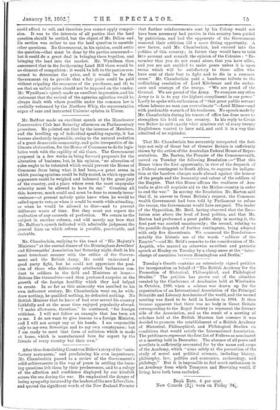Mr. Balfour made an excellent speech at the Manchester Conservative
Club last Saturday afternoon on Parliamentary procedure. He pointed out that by the increase of Members, and the levelling up of individual speaking capacity, it has become absolutely impossible, owing to the natural evolution of a great democratic community, and quite irrespective of de- liberate obstruction, for the House of Commons to do its legis- lative work with the rapidity of old times. The Government proposed in a few weeks to bring forward proposals for the alteration of business, but, in his opinion, "no alteration of rules ought to be tolerated which would prevent the House of Commons from being what it, had been,—a great arena in which passing opinions could be fully stated, in which opposite arguments could be weighed and balanced by the great jury of the country, and a place where even the most unpopular minority must be allowed to have its say." Granting all this, however, much could and must be done to remedy incon- venience—at present nobody quite knew when he would be called upon to vote, or when it would be worth while attending, or when he would be allowed to dine—and to prevent deliberate waste of time. But they must not expect the realisation of any counsels of perfection. We return to the subject in another column, and will merely say here that Mr. Balfour's speech indicated with admirable judgment the general lines on which reform is possible, practicable, and desirable.






































 Previous page
Previous page